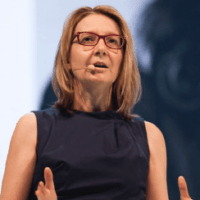By Richard Socarides, Chief Communications Officer at GLG

Photo: (L-R) LinkedIn’s Cammie Erickson and Braven Founder and CEO Aimée Eubanks Davis
This year saw business embrace social impact more than ever before. Among other things, the Business Roundtable released a statement in August redefining the responsibility of corporations to extend not only to shareholders, but also to employees, suppliers, customers, and communities. This holistic view of the role that corporations play in society led companies and their leaders to reflect on their potential – and responsibility – to make the world a better place.
GLG recently hosted more than 100 guests at our global headquarters in New York for Changing the Rules for Changing the World, a half-day conference on the future of business and social impact. An impressive group of leaders participated in panel discussions focused on the question: what is the role of the private sector in driving social change? You can watch full recordings of the panels, as well as a video highlighting the event, here.
Three key insights about how businesses and the public sector can collaborate to make a difference emerged from the year, and also from our conference. They include takeaways that leaders across industries and sectors can bring to their organizations to enhance their social impact:
1. Businesses must leverage their unique capabilities to maximize social impact.
At our conference, Erin Robert, Executive Director of Sustainable Finance at JPMorgan Chase, spoke about a central question that fuels their impact-finance work: “How do we leverage not just the financial products and breadth of an institution like JPMorgan Chase, but how do we get the employees we have to leverage their skillsets to advance large issues? How do we do it in a way that is authentic to the firm and brings our expertise?”
Companies can unlock one-of-a-kind impact by authentically and creatively channeling their insights and strengths. For example, apparel company TOMS matches every pair of shoes that its customers purchase by donating a pair to a child in need – giving more than 60 million pairs to children since 2006. At GLG, our Social Impact Partners Program allows any GLG employee to nominate a nonprofit for free access to GLG’s unique platform.
2. Purpose is more important than ever before.
Henry Timms, President and CEO of Lincoln Center, reflected on the changing significance of company purpose. “The big challenge for companies now is actually reckoning with this idea that purpose needs to be a very significant commitment at the heart of the company,” he said. “It also needs to be participatory. Because it’s not just something you can shout at the world – you have to create a mindset where other people are engaging in your mission on their terms.”
People want their work, and the broader work of their organizations, to mean something – to reflect shared values and contribute to the social good. For the private sector to have a real social impact, businesses must operate with genuine purpose that guides strategy and motivates employee buy-in. When CVS decided to stop selling cigarettes, for example, CEO Larry Merlo explained that “Tobacco products have no place in a setting where healthcare is delivered.” The company put its values before immediate profit, not only doing the right thing, but also clearly communicating its purpose, differentiating its brand in the marketplace, and increasing customer loyalty.
3. We’re all in this together.
Ken Mehlman, Global Head of Public Affairs and Co-Head of Global Impact at KKR, said, “What we’re going to need fundamentally – and business needs to be part of it – is a new social compact that says: here’s the relationship between individuals, institutions, society, government, and business, and all of us need to help develop it, so that it’s relevant for the world in which we live.”
To me, this means that confronting and resolving the world’s most demanding challenges requires coordinated action from private and public entities. Stakeholders will have to foster inclusive, in-depth collaboration to effect long-term change.
These examples were just a few highlights from the year and our conference – I hope you watch the panel videos to learn more about this crucial moment and its implications for the private sector. Other panelists included GLG CEO Paul Todd, David Gelles (The New York Times), Kathy Wylde (Partnership for New York City), Cammie Erickson (LinkedIn), Cristina Shapiro (Goldman Sachs Foundation), Betty Liu (NYSE Group), Jeremy Heimans (Purpose), a number of our GLG Social Impact Fellows, and GLG Director of Social Impact Jen Field.



